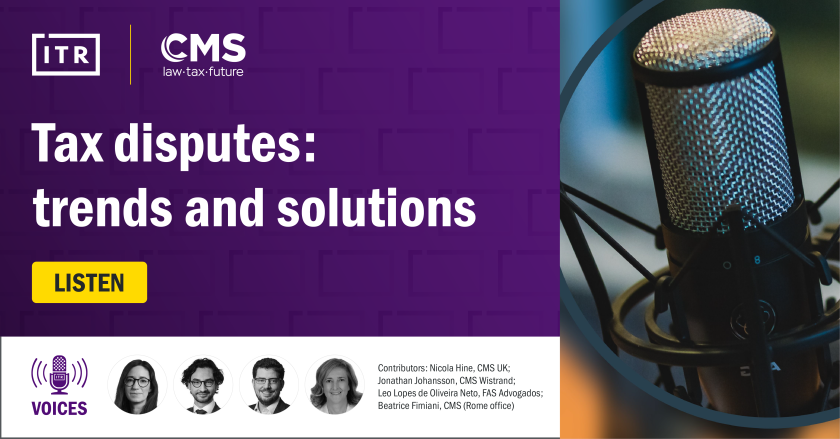Spare a thought for tax authorities. An unlikely sentiment, perhaps, but they are facing arguably unprecedented demands at present.
Governments are striving to boost revenue collection in response to macroeconomic and geopolitical factors, new reporting requirements are being imposed, and capacity is stretched by the need to handle an enormous amount of data. AI is helping to manage these issues, however, according to an ITR podcast in which four expert tax practitioners discuss the latest auditing and tax litigation trends.
This article highlights several key points from the conversation.
Tax authorities: heightened pressures, new solutions
The podcast’s speakers are based in different jurisdictions but united by common tax trends. The first is that governments are, as ever, turning to tax authorities for additional income. Nicola Hine, a partner at CMS UK, notes: “We’re seeing changes arising from the current economic circumstances. Things like inflation, the cost-of-living crisis, global political instability, and Trump’s tariffs and tax policies. What does this result in? A continued need for revenue and increasing tax collection.”
New demands are being placed on taxpayers and tax authorities alike, but the latter’s capabilities have been fundamentally changed by technology. Jonathan Johansson, tax counsel at CMS Wistrand in Sweden, says: “Over the past several years, there’s been this global trend to increase legislation regarding reporting obligations. Tax agencies have started to get vast amounts of information. And now, with the dawn of AI, they’re able to process that information and utilise it more efficiently than before.”
This new tool has the potential to change tax authorities’ strategy, with significant implications for taxpayers. “There’s been a bit more of an aggressive approach to litigation, at least in Sweden,” Johansson adds. “And I think this is a result of the efficiency.
Automation and AI introduce the risk of tax assessments being issued based on insufficient evidence
“There was a tactic some used to attempt to avoid scrutiny. They’d overdisclose to the tax agency; send in all the information they had. The taxing agency would drown in it and I think that wasn’t a good tactic before, but it certainly isn’t a good one now because now the agency has much greater tools to pick out mistakes. AI, in combination with access to the vast amounts of information through these reporting obligations, is going to make it easier to litigate at an increased level.”
The likelihood of an increase in litigation, as well as audits, is also conveyed by Hine and Beatrice Fimiani, a partner in CMS’s Rome office. “In the UK, there’s further investment in tackling tax non-compliance,” Hine says. “That includes increasing staff, technology, AI, and a focus on upstream compliance activity. I expect additional investigations from HMRC [the UK tax authority] as a result.”
“In the Italian jurisdiction, tax disputes are primarily being driven by legislative measures, which have increased audit activity,” Fimiani adds, before explaining that the nature of audits, as well as their frequency, is changing. “A notable trend is the growing reliance on tax credits and incentives aimed at fostering investment and development in specific sectors. This has given rise to a greater volume of tax audits and related disputes concerning entitlement to these benefits. Audit practices have become increasingly sophisticated.”
However, this sophistication brings new dangers, according to Leo Lopes de Oliveira Neto, who leads the tax litigation practice at FAS Advogados in Brazil. “The Federal Revenue Service has intensified audits to maximise revenue collection,” he says. “In Brazil, the tax authorities have significantly increased their use of technology.
“While automation and AI bring substantial efficiency gains, they also introduce the risk of tax assessments being issued based on insufficient evidence. It has reduced human review and can lead to unnecessary disputes. They have to find a balance [between] using AI and having tax authorities involved in tax assessments to address these challenges.”
Taxpayers: strategic considerations
With AI helping to put taxpayers under heightened scrutiny, how can they mitigate the risks of tax controversy? The speakers suggest several measures.
“[Companies] are investing in robust internal compliance systems to review processes and to provide staff training to ensure accurate and transparent tax reports,” Lopes de Oliveira Neto says.
It is clear why training and updated systems are necessary.
“There’s a huge amount of documentation out there,” Hine says. “What is really key is proactive management of tax risk, including cross-border.
“Retention of evidence and clear records are critical. Often, documents fall off a cliff. If you lose a lot of contemporaneous emails that are difficult to get back, if at all, that can really affect your case. What I would say to people is be aware of those key actors, think about what happens when they leave, how they might help you with evidence.”
Taxpayers should consider whether an administrative resolution may offer a more expedient outcome
Hine is not alone in emphasising the importance of effective documentation management. “It’s crucial for businesses to focus on early evidence gathering,” Lopes de Oliveira Neto adds. “Proper documentation will be very relevant to have a favourable outcome in a potential dispute.
“And carefully monitor developments in case law and stay alert to possible shifts in the superior courts. This ongoing legal mapping is essential to decide if litigation [should be pursued] against the tax authorities or [to] take advantage of settlements, that may offer significant reductions of fines.”
Fimiani echoes that pursuing settlement rather than litigation can be a cost-efficient strategy, based on national practice. “While recent legislative reforms in Italy have reduced many penalties, they remain significant, and a number of administrative procedures offer the possibility of settling disputes more efficiently and with reduced penalties,” she says. “Accordingly, before initiating formal litigation, taxpayers should consider whether an administrative resolution, potentially involving cross-examination with the tax authorities, may offer a more expedient outcome.”
Three key recommendations for taxpayers therefore emerge from the speakers’ insights:
Take early and proactive measures;
Ensure documentation best practices are maintained; and
Consider settlement rather than litigation if appropriate.
Tax disputes: an evolving global landscape
As well as covering tax dispute trends and legislative updates in the UK, Sweden, Italy, and Brazil, the podcast addresses the following areas:
The taxation of crypto assets;
The principal purpose test; and
Treaty shopping and the beneficial ownership requirement.
In summing up, however, the discussion returns to the central, cautionary message. “There’s a continued need to increase tax take [and] additional challenges from tax authorities,” Hine says. “The need is there to consider strategy, litigation, and investigations at an early stage, expecting the use of tech tools to identify non-compliance. So, seeking to stop tax issues before they start, but very much proactively managing the relationship with the tax authority.”
With all that to consider, perhaps it is not the tax authorities we should be sparing a thought for, but taxpayers.
Sharing their insights

Nicola Hine
Partner, CMS UK

Jonathan Johansson
Counsel, CMS Wistrand

Leo Lopes de Oliveira Neto
Partner, FAS Advogados

Beatrice Fimiani
Partner, CMS (Rome office)












